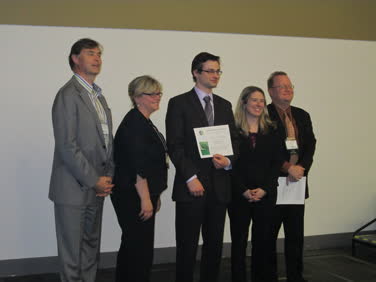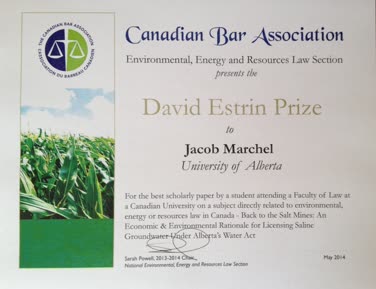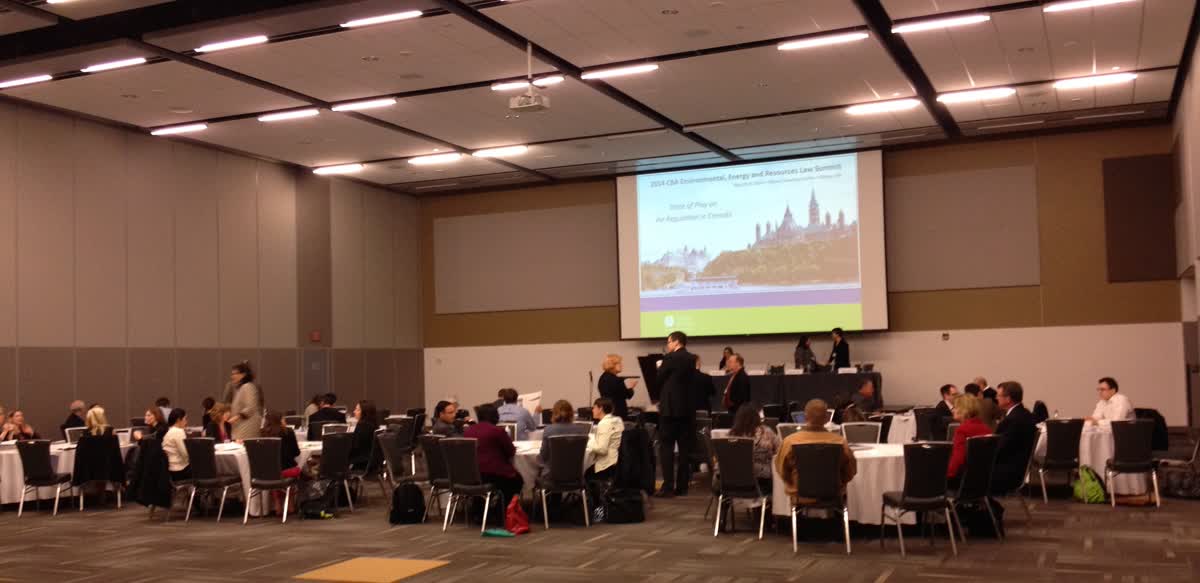 Jacob Marchel 3L at CBA's NEERLS Conference (Ottawa) receiving 2014 David Estrin Prize
Jacob Marchel 3L at CBA's NEERLS Conference (Ottawa) receiving 2014 David Estrin PrizeThe University of Alberta Faculty of Law would like to congratulate student Jacob Marchel (3L) on being awarded the Canadian Bar Association's 2014 National Environmental, Energy and Resources Law Section (NEERLS) Law School Essay Contest David Estrin Prize.
Jacob's essay, Back to the Salt Mines: An Economic & Environmental Rationale for Licensing Saline Groundwater Under Alberta's Water Act, demonstrates that by licensing saline groundwater diversions it could allow Alberta to (1) take advantage of market forces in relation to water allocations, (2) establish greater environmental protections for saline groundwater as its usefulness as a resources will increase over time, (3) alleviate stress on surface water bodies, (4) conserve Alberta's diverse surrounding environment and/or ecosystems, and (5) allow for greater public access to the environmentally impactful activities of the oil and gas industry, as well as any other future users.
 CBC certificate for David Estrin Prize to Jacob Marchel 3L U of A Faculty of Law
CBC certificate for David Estrin Prize to Jacob Marchel 3L U of A Faculty of Law"I am amazed, honoured, and truly humbled to have received this year's David Estrin Prize," Jacob said when asked about his reaction to being awarded the David Estrin Prize. "For those who might not know of him, Mr. David Estrin is one of Canada's most recognized environmental law specialists, so to have his name in any way associated with mine is quite frankly unbelievable."
Jacob was recently presented with the David Estrin Prize at the CBA's NEERLS conference and business meeting in Ottawa.
Interview with Jacob Marchel (3L)
1) Describe your winning essay
The title of my essay is Back to the Salt Mines: An Economic & Environmental Rationale for Licensing Saline Groundwater Under Alberta's Water Act. In general water can be classified two ways: (1) Fresh, and (2) Saline. For fresh water, Alberta's Water Act requires that a 'water license' be obtained prior to diverting it. These requirements work to maximize the utility of the fresh water, both economically and environmentally. In comparison, the Act exempts saline groundwater from such license requirements, and this regulatory configuration effectively bars the transfer or assignment of saline water and creates a division between the jurisdictional management of saline and fresh water.
This distinction exists because saline groundwater has historically been viewed as useless, with saline groundwater aquifers being used more as a dumping ground than anything else. However, since the 1970s the oil and gas industry has significantly increased its use of saline groundwater. This has demonstrated saline groundwater's potential utility but has also put its sustainability in danger as industry practices are removing large quantities from the hydrological cycle.
I demonstrate in my essay that by licensing saline groundwater diversions it could allow Alberta to (1) take advantage of market forces in relation to water allocations, (2) establish greater environmental protections for saline groundwater as its usefulness as a resources will increase over time, (3) alleviate stress on surface water bodies, (4) conserve Alberta's diverse surrounding environment and/or ecosystems, and (5) allow for greater public access to the environmentally impactful activities of the oil and gas industry, as well as any other future users.
2) Where did the inspiration to write this essay come from?
I originally wrote this paper during the fall term of my second year for Professor David Percy's Water Law course. It was he who suggested I research issues related to saline groundwater in Alberta. However, the core idea for my thesis came from a brief 2009 Alberta Oil Magazine article written by Jason Unger, who works as staff counsel for the Environmental Law Centre here in Edmonton. I took Mr. Unger's idea, slightly modified and added to his argument, as well as did the necessary additional research to back-up my thesis. Afterwards, after receiving back my graded essay, I edited it using Professor Percy's suggestions and submitted it to the CBA NEERLS essay contest. Finally, after receiving the award, one of the judges, Ms. Journey Paulus, graciously suggested some further minor edits which I later incorporated. It is this final copy of my essay that will be published in the CBA's Fall 2014 edition of the Ecobulletin.
3) Describe your interest in environmental law and how you see it influencing the direction of your future career
My interest in environmental law started in the final year of my undergraduate studies at the University of Waterloo. At that time I had volunteered with a not-for-profit student group called STEP (the Sustainable Technology Education Project). The focus at STEP was integrating renewable energy technology into the campus, but during my time there I also became exposed to many other issues related to the environment (e.g. climate changes, GMOs, etc.) and it ignited my interest in science and environmental sustainability. Although I'm interested in all aspects of environmental law, my particular interest is with renewable energy. In terms of my future legal career, I decided to pursue environmental law because it blends my academic interest in law with my passion for environmental sustainability. In addition, I cannot imagine a future in Canada where major business developments or political issues will not in some way be influenced or directly applicable/related to an environmental issue. In fact, one of the most interesting things I learned while attending this year's CBA NEERLS conference is that compared to the United States, Canada's environmental legal field is still very new and much like 'the wild west' of law. This means that environmental law in Canada currently has great potential for innovative development, and so I'm working towards having a career that positively contributes to that development.
Additional Information:
Click link to read Jacob Marchel's winning essay, Back to the Salt Mines: An Economic & Environmental Rationale for Licensing Saline Groundwater Under Alberta's Water Act
 CBA's NEERLS Conference & Business Meeting (Ottawa)
CBA's NEERLS Conference & Business Meeting (Ottawa)